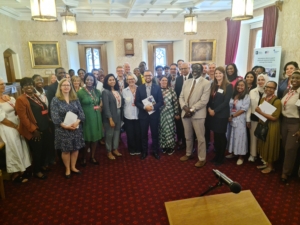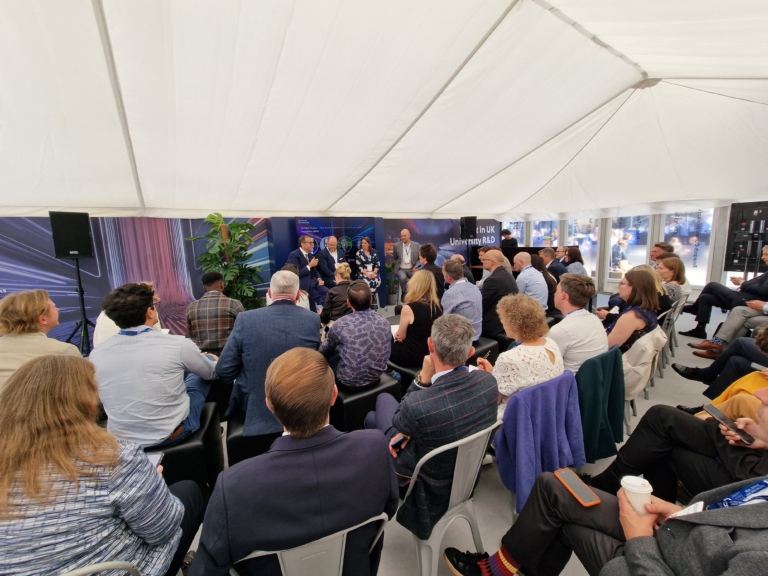This article is authored by Dr Ian Hancox, Technician Research Engagement Manager at the University of Warwick and Co-lead of TALENT – a Research England funded project led by Midlands Innovation.
The UK’s research and innovation sector thrives when academics, research managers, PIs and the wider research community collaborates. Technicians are a crucial part of the research and innovation ecosystem.
Due to the diversity of technical roles – especially in higher education – technicians are resourced in several different ways, but could the system be made clearer and improved upon to ensure the technical workforce has the skills and staffing to meet future demands from emerging sectors?
A national policy commission has published a new report that sets out a blueprint for the future of technical staff in higher education and research, the TALENT Commission.
The report reveals a bold vision to strengthen the UK’s position in science, engineering and the creative industries. Funded by Research England, it includes new data about skills, roles and careers of the UK’s technical talent and 16 targeted recommendations for the sector.
It explores how technical staff are funded and resourced by institutions and outlines how employers of technicians and funders can help create a funding landscape that supports and enables opportunities for the technical community. There is a need for transparent, easily understood, and accessible guidance for inclusion on proposals.
The TALENT Commission also sets out several recommendations for employers to help improve research culture and shift the narrative that separates technical and academic skills – despite how closely they work together. These include broadening career pathways to allow greater movement across sectors, involving technicians in the hiring process for technical roles, actively engaging technicians in outreach activities and providing protected learning time for technical professional development opportunities.
The current funding landscape
Due to the diverse range of roles and responsibilities that technical staff have, directly and indirectly contributing to research, there needs to be a range of methods for costing technical roles onto proposals to allow institutions to flexibly maximise cost recovery. However, these options understandably increase complexity in costings.
Funding routes tend to differ by the type of research project and the type of technical role in question. For projects funded by UKRI, institutions follow the transparent approach to costing (TRAC) methodology to calculate costs. The four common approaches are: directly allocated (DA) staff costs, directly incurred (DI) staff costs, facility charges and estates and indirect costs. A combination of these mechanisms tends to be used by institutions depending on the needs of each research project and the resources required.
Higher Education Institutes (HEIs) also fund technical staff from the dual support funding, with many utilising the quality related (QR funding) from national funders to support ‘core funded’ technicians.
The TALENT Commission report explores whether perceptions are impacting funding decisions taken by employers of technicians. It highlights that, while most technicians have their basic salary funded directly by their institutions (83%), HESA data reveals stark differences in funding sources between disciplines.
Researchers for the Commission carried out their own quantitative and qualitative research which mirrored the HESA data set. Funding from the HE provider is typically higher in subject areas outside of STEM (98% of technicians in design, creative and performing arts funded directly by institutions). Research technicians are more likely to be funded on external research grants.
Further exploration into how technical staff are included on proposals across different staff groups revealed that PIs and research managers were likely to include technical staff in the costing process during the development of grant applications and to check calculations, for instance. Yet technicians themselves reported a much lower level of engagement, indicating a marked difference in perception between these staff groups.
The data revealed a lack of certainty from facility managers, technical managers and technicians on how technical staff are costed onto grants. Interestingly, all staff groups, including research managers and administrators, stated that there was a lack of clear guidance from their organisation on how to include technical staff on grants.
Valuable conversations during focus groups highlighted the complexity of the funding landscape and led people to regard it as transparent, but not clear, particularly at a local level. Worryingly, there were reports of to be a perceived ‘cap’ on UKRI funding applications (even when this isn’t in place), influencing the costs included on proposals; with reports that technicians are the first to be removed to make proposals ‘cheaper’.
Future funding outlook – clarity and opportunities
The TALENT Commission noted the continued need for various costing methods when including technician costs onto proposals, given the diverse nature of roles and responsibilities. The report recommends that institutions can better support their technical staff, research managers and PIs to establish and implement processes and guidance to fund the technical workforce appropriately. This is paramount to support technical staff time on research projects, enable career development, recognition and sustainability.
Funders play a vital role in shaping progress in this area too. The report recommendations call for clear and transparent guidelines from funders on how technical staff are costed onto grants, alongside guidance on the roles that technical staff hold on grants. The latter has seen recent positive changes from funders, including guidance that technicians can be PI or CoI on proposals, highlighted in recent calls from BBSRC, EPSRC and MRC.
Overall, implementing these recommendations would ensure that technical staff aren’t disadvantaged in relation to other staff roles in the research ecosystem. It would also act to ensure effective cost recovery and provide true costs of the team involved in enabling research. Given how critical their roles are in the future of the research and innovation, it’s a key component to safeguard and enhance recognition of technical roles and one to be considered by research managers and institutions.
Learn more about the TALENT Commission’s proposed recommendations on clear and consistent guidance for funding calls and much more in the full report www.mitalent.ac.uk/theTALENTCommission.
Further reading: Funding Technician Staff in Research






